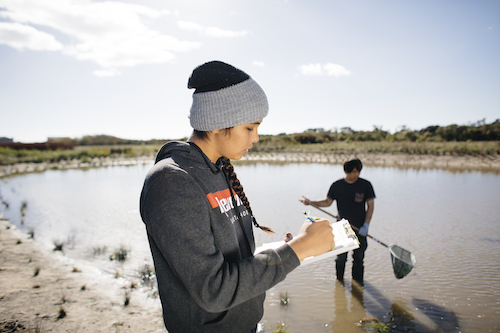Campus News
UC Santa Cruz ranked No. 2 Best Public University for Making an Impact by Princeton Review
For the second year in a row, UC Santa Cruz has been ranked as the No. 2 Best Public University for Making an Impact by Princeton Review.

2022, research, UCSC Native plant restoration
For the second year in a row, UC Santa Cruz has been ranked as the No. 2 Best Public University for Making an Impact by Princeton Review.
Through rigorous research and scholarship, community partnerships, and innovative programs, UC Santa Cruz is driving meaningful change and making a real difference in the lives of individuals and communities locally, nationally, and globally. From promoting social justice and environmental sustainability to advancing groundbreaking research, UC Santa Cruz is a force for good, and its students, staff, faculty, and alumni are working tirelessly to create a better, more equitable world.
“Our students are trailblazers, actively working to champion a better tomorrow. Determined to make a positive impact on the world, they combine their co-curricular leadership initiatives and experiences with their academic pursuits to advocate for change, justice, and equity,” said Vice Chancellor for Student Affairs and Success Akirah Bradley-Armstrong. “They come to UC Santa Cruz wanting to make the world a better place and leave even more equipped to do so.”
Marisol Ornelas (Stevenson ‘24, politics and legal studies) is one of the many students at UC Santa Cruz who strives to make a positive impact on their world. She is working to remedy the many obstacles on the road to higher education. A first-generation student, Ornelas’s passions include giving back to her community, student activism, and labor and education policy.
Ornelas currently works as a paralegal assistant with Medina Paralegal Services, is a community engagement intern with local nonprofit Senderos, and is an intern with nonprofit organization, Women In Leadership for Diverse Representation. She is working toward combating the rising cost of a college education and offers guidance for students to take advantage of the many resources UC Santa Cruz has to offer.
UC Santa Cruz has long been recognized as a leader in higher education, with a strong commitment to academic excellence and innovation. The campus pairs high-impact research with 10 tight-knit undergraduate residential colleges that offer students the experience of a small liberal arts college with the depth and rigor of a major research university. The colleges are guided by distinct themes that inform their academic and student life programs.
In addition to its outstanding academic programs, UC Santa Cruz is also known for its commitment to social justice and sustainability. The university is home to a diverse student body, with students from all over the world, and offers a wide range of student activities and organizations that promote civic engagement and community service.
UC Santa Cruz is one of only four universities to share the distinction of being a member of the Association of American Universities and designated as a Hispanic-Serving Institution and an Asian American and Native American Pacific Islander-Serving Institution. Last year, UC Santa Cruz joined other leading universities to form the Alliance of Hispanic Serving Research Universities, a coalition dedicated to increasing opportunities for those historically underserved by higher education.
Princeton Review developed the ranking using student ratings and responses to survey questions covering community service opportunities at their school, student government, sustainability efforts, and on-campus student engagement. The ranking also factored in PayScale.com’s percentage of alumni from each school that reported having high job meaning.
Princeton Review also ranked UC Santa Cruz the No. 31 Best Value Public School in the United States for 2023, recognition reflecting the campus’s commitment to academic excellence, affordability, and social responsibility.
The list is based on a comprehensive assessment of more than 650 colleges and universities across the country. The rankings take into account factors such as academics, cost of attendance, financial aid, and career prospects for graduates.